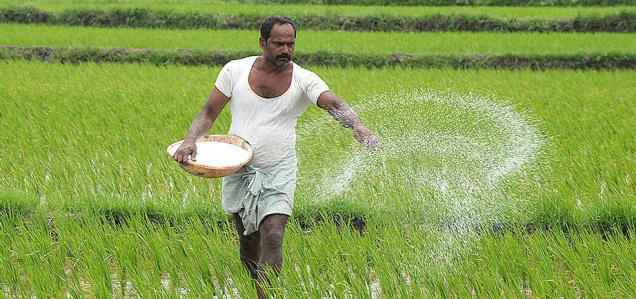Budget 2018, the last full year Budget of the Modi government, is undoubtedly a calibrated departure from policy in the last two decades. A careful study of the fine print of the Budget clearly suggests that agriculture is the prime focus.
Agriculture is the backbone of Indian economy. Around 70 per cent of India’s population depend on agriculture for their livelihood. The agriculture sector contributes approximately 17 per cent of the total Gross Domestic Product (GDP). Agriculture has the potential in turning around the Indian economy.
In a bid to propel the sector, Finance Minister Arun Jaitley has announced raft of measures. The idea is welfare of the farmers. The aim is to make agriculture an engine of employment, growth and development. The focus is on development and upgradation of agricultural infrastructure. The Finance Minister has emphasised on the Modi government’s commitment in achieving the target of doubling farmers’ income by 2022, the 75th year of India’s Independence.
In order to create and develop rural infrastructure and connect farmers directly to the markets, the government has earmarked a whopping Rs 14.34 lakh crore for 2018-19. The proposed investment will also generate employment to the tune of 321 person-days in FY18. The government has announced an Agri-Market infrastructure Fund with a corpus of Rs 2000 crore for developing and upgrading agricultural marketing. This will in turn help enable the famers to get the right price for their produce. Further, the government has hiked the agricultural credit target to a whopping Rs 11 lakh crore.
A big support to the famers in this Budget is the promise of Minimum Support Price (MSP). The government will keep the MSP for all unaccounted kharif crops at least 1.5 times of the cost of production. The Finance Minister said in his Budget speech, “NITI Ayog in consultation with Central and state governments will put in place a full proof mechanism so that famers will get adequate price for their produce.”
The government has doubled the allocation for Food Processing Ministry from Rs 715 crore in FY17 to Rs 1400 crore in FY18. In order to address the price volatility of perishable commodities like potatoes, tomatoes and onions, the government has announced the launching of Operation Greens with an outlay of Rs 500 crore. The government has announced the development and up-gradation of existing 22,000 rural haats into Grameen Agricultural Markets (GrAMs). Rs 2600 crore has been allocated to ensure irrigation facilities in 96 irrigation deprived districts.
The Finance Minister has announced the launch of a Re-structured National Bamboo Mission and Rs 1,290 crore has been earmarked for this. The FM has announced two new funds – Fisheries Aquaculture Infrastructure Development Fund (FAIDF) and Animal Husbandry Infrastructure Development Fund (AHIDF) –with a corpus of Rs 10,000 crore each.
“It is indeed heartening to see that after many decades the theme of agriculture dominates the Union Budget. This Budget has spelt out the government’s clear intention towards incising farmers’ income and augmenting agricultural infrastructure. However, the implementation will remain a challenge. The Centre and states must come together to implement the much needed measures,” said Mohini Mohan Mishra, well-known agriculture scientist and national secretary of Bharatiya Kisan Sangh.
Mission Antyodaya (Empowering the underpowered) has been the theme of Budget 2018 and that clearly reflects when the Finance Minister quoted Swami Vivekananda in his Budget speech. “…let New India arise in your place. Let her arise out of the peasants’ cottage, grasping the plough; out of the huts of the fishermen, the cobbler and the sweeper. Let her emanate from the factory, from the marts, and from the markets. Let her emerge from groves and forests, from hills and mountains.”
Budget 2018 is certainly made inroads in containing agrarian distress and strengthening agriculture and rural economy. The Budget will go a long way toward bridging the rural-urban divide. It could rightly be termed as a Budget for Bharat.
(The writer is a senior journalist, and researcher based out of Delhi. He writes on politics, policy, national interest and cultural nationalism.)
(The views expressed are the author's own and do not necessarily reflect the position of the organisation)

